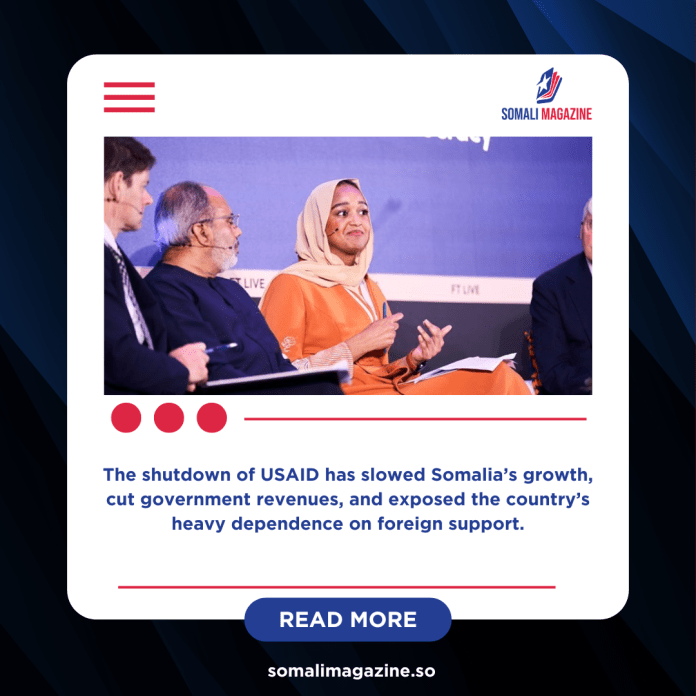Facebook Twitter (X) Instagram Somali Magazine - People's Magazine
The closure of the U.S. Agency for International Development (USAID) earlier this year has dealt a heavy blow to Somalia’s already fragile economy, according to Hodan Osman, president of the Somali Development and Reconstruction Bank. Speaking at the Financial Times Africa Summit in London on Tuesday, Osman said the loss of U.S. aid has rippled through the country’s financial system, stalling growth and weakening government revenues.
She explained that the decision by Washington to shut down USAID and cut foreign aid programs has deeply affected Somalia’s economic activity. “In Somalia, it really impacted our GDP,” she said. Osman noted that the aid cuts not only disrupted development projects but also triggered a slowdown in business activity, leading to lower tax collections. “It also had a severe impact just on the economy alone that we weren’t really thinking about,” she added, describing how the country’s financial institutions and public services are now grappling with the aftereffects.
For decades, USAID played a key role in Somalia’s recovery efforts by funding health, education, and infrastructure programs. Its presence helped stabilize communities, create jobs, and attract private investment. The sudden withdrawal of such support has left a void that the Somali government and local organizations are struggling to fill. Many small businesses that benefited indirectly from aid-funded projects have seen their income decline, while social programs dependent on foreign assistance have either scaled back or shut down completely.
The economic shock has been particularly hard on ordinary citizens. With fewer resources flowing into public projects, job opportunities have dwindled, especially for young people. Rising living costs and shrinking household incomes have further strained families already coping with droughts, insecurity, and high unemployment. Economists warn that this combination of challenges could push more people into poverty and make recovery harder in the years ahead.
Osman emphasized that Somalia’s economy is closely tied to international support and that sudden changes in aid flows have far-reaching consequences. She urged both local authorities and international partners to seek new ways of sustaining development without overreliance on foreign donors. “We need to build resilience and diversify our economy,” she said. “That means strengthening our institutions, supporting entrepreneurship, and finding domestic solutions to our challenges.”
The aid cuts come as Somalia works to rebuild after decades of conflict and instability. The government has made progress in improving fiscal management and promoting investment, but limited resources continue to hinder long-term growth. Without consistent international backing, efforts to modernize infrastructure, expand access to healthcare, and reform education are likely to slow down significantly.
Observers say the closure of USAID reflects a broader shift in U.S. foreign policy under President Donald Trump, whose administration has prioritized domestic spending over international aid. The move has drawn criticism from humanitarian organizations that argue such decisions undermine development gains in vulnerable countries. For Somalia, the timing is especially difficult, as the nation faces ongoing threats from climate change, insecurity, and a fragile political environment.
Despite the challenges, Osman expressed cautious optimism that Somalia can adapt. She said the crisis might serve as a wake-up call for the country to invest more in self-sufficiency and innovation. “It’s a difficult moment, but it’s also an opportunity for us to rethink how we grow,” she said. “We can use this setback to strengthen our systems and rely more on our own capacity.”
While Somalia continues to navigate the aftermath of the aid withdrawal, the message from its development leaders is clear: rebuilding resilience at home will be essential to sustaining progress in the absence of major foreign partners.

